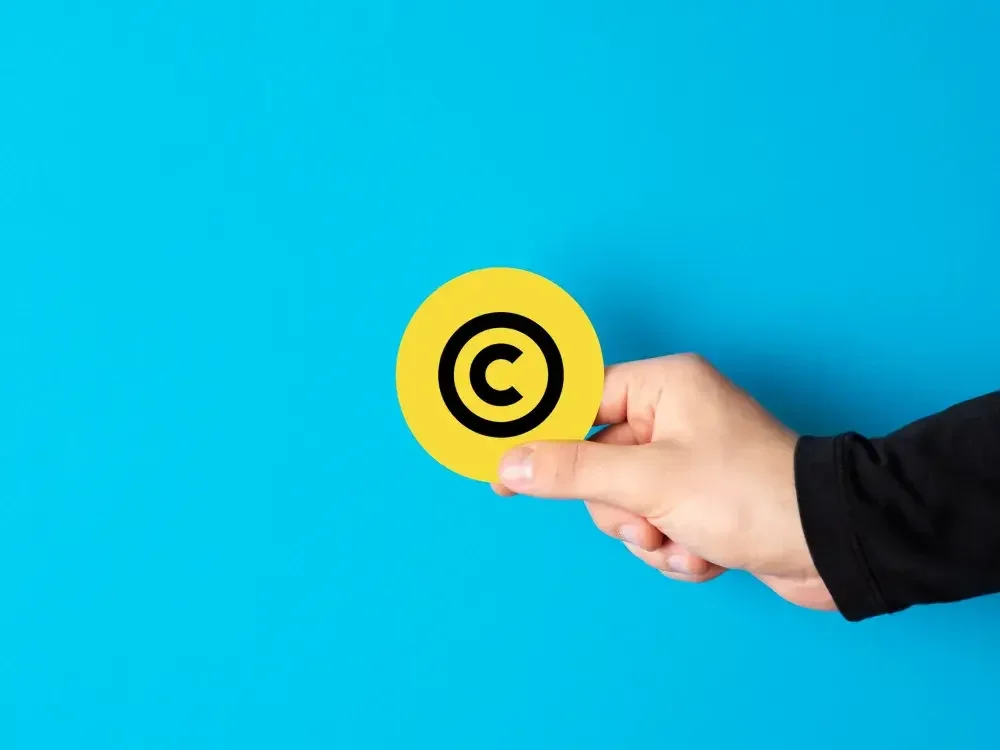The U.S. Copyright Office, which enforces copyright law, defines copyright as "a type of intellectual property that protects original works of authorship as soon as the author fixes the work in a tangible form of expression."
We'll break down what that means and what kinds of works can be protected under copyright law. Plus, learn what copyright protection gives you. 
What do 'original authorship' and 'fixed works ' mean?
The key terms in the definition or copyright are "original authorship" and "fixed works." To be an original work, a work must be both independently created by a human author and have a minimal degree of creativity. Nothing can be copied. AI cannot be used.
To be a fixed work means that the work "can be perceived, reproduced, or communicated for more than a short time," according to the Copyright Office. Think of the last picture of a sunset you took on your phone. That's considered a creative work—the image by an author, you, that has been captured on a sufficiently permanent medium. Your photograph can be seen ("perceived"), copied ("reproduced"), and sent out ("communicated").
Meeting these requirements conveys copyright ownership.
How does copyright work?
Once an author produces a fixed, original work, copyright exists. An author doesn't need to register a work with the U.S. Copyright Office for it to belong to them. Automatic protection exists once the parameters described above are met. To protect and enforce the exclusive rights of copyright, however, registration is mandatory.
The author isn't the only person who can be a copyright owner. Companies and organizations regularly contract or hire people to create original work and negotiate ownership through works made for hire. The author may have been the first owner of the copyright, but in consideration for payment, the copyright protection extends to someone else (think ghostwritten books).
Copyright ownership can also be shared "when two or more authors create a single work with the intent of merging their contributions into inseparable or interdependent parts of a unitary whole," according to the Copyright Office.
Copyrights can also be passed on through contracts, assignments, wills, and bequests.
Works protected by copyright
Once a work meets the original and fixed components, you must determine the form of copyright your work falls under. There are four forms:
- Literary works
- Dramatic works
- Musical works
- Artistic works
Works that can receive copyright protection:
- Literary works, e.g., novels, blogs, poems, newspaper articles, certain compilations
- Musical works, including any accompanying words, e.g., songs, musical notes
- Dramatic works, including any accompanying music, e.g., plays
- Pantomimes and choreographic works, e.g., dance routines, band routines
- Pictorial, graphic, and sculptural works, e.g., photographs, paintings, drawings, sculptures
- Motion pictures and other audiovisual works, e.g., movies, commercials
- Sound recordings, which are works that result from fixing a series of musical, spoken, or other sounds, e.g., audiobooks, sound effects
- Architectural works, e.g., building or other architectural plans
To decide which category your original literary and artistic works fall under, think broadly. Computer programs and computer software may not seem to be particularly artistic, but they fall under the literary works category. Maps and technical drawings, too, may not seem to fall into any category, but they are considered pictorial and graphic works.
Works not protected by copyright
The following works cannot be copyrighted, according to the Copyright Office:
- Ideas, procedures, methods, systems, processes, concepts, principles, or discoveries
- Works that are not fixed in a tangible form, e.g., a choreographic work that has not been notated or recorded or an improvisational speech that has not been written down
- Titles, names, short phrases, and slogans
- Familiar symbols or designs
- Mere variations of typographic ornamentation, lettering, or coloring
- Mere listings of ingredients or contents
More detailed information on what original works are not protected can be found in the Copyright Office's Circular 33, "Works Not Protected by Copyright."
What rights are conferred by copyright protection?
According to the Copyright Office, U.S. copyright law protects the work of original authors by giving them the right to:
- Reproduce the work in copies or phonorecords
- Prepare derivative works based on the work
- Distribute copies or phonorecords of the work to the public by sale or other transfer of ownership by rental, lease, or lending
- Perform the work publicly if it is a literary, musical, dramatic, or choreographic work; a pantomime; or motion picture or other audiovisual work
- Display the work publicly if it is a literary, musical, dramatic, or choreographic work; a pantomime; or a pictorial, graphic, or sculptural work. This right also applies to the individual images of a motion picture or other audiovisual work.
- Perform the work publicly by means of a digital audio transmission if the work is a sound recording."
The first author also has the right to authorize others to exercise these exclusive rights under certain statutory limitations.
How long does a copyright protection last?
How long copyright protection lasts depends upon when the original work was created. In general, if a work was created on or after Jan. 1, 1978, the copyright term is for the life of the author plus 70 years after the author's death.
For joint works where copyright is shared, the term lasts 70 years after the last surviving author's death.
For anonymous or pseudonymous works and works made for hire, copyright lasts for 95 years from publication or 120 years from creation, which ever is shorter.
For original works that were created before Jan. 1, 1978, that were not published or registered as of that date, copyright exists for the same amount of time as works created after that date. "The law, however, provides that in no case would the term have expired before December 31, 2002, and if the work was published on or before that date, the term will not expire before December 31, 2047," according to the Copyright Office's Circular 1.
If your original work was created before Jan. 1, 1978, and was published or registered before that date, "the initial term of copyright was 28 years from the original date of publication with notice from the date of registration. At the end of the initial term, the copyright can be renewed for another 67 years for a total term of protection of up to 95 years," according to Circular 1. Two registrations—one for the original term and another for the renewal term—must be made before the original term expires to extend the copyright into a renewal term. The renewal term registration requirement was eliminated on June 26, 1992, and is now optional.
More detailed information can be found in Duration of Copyright (Circular 15 A) and Renewal of Copyright (Circular 6A).
Transfer of copyright ownership
Any or all of the first owner's exclusive rights or parts of those rights can be transferred. Generally, the transfer must be made in writing and signed by the first owner of the rights or the first owner's authorized agent. If the rights transfer is on a nonexclusive basis, a written agreement is not required.
"You can bequeath a copyright by will or pass it along as personal property under applicable state laws of inter-state succession. It can also be conveyed by operation of law," according to Circular 1.
You can also record transfer of ownership with the Copyright Office through its Office of Public Records and Repositories. While recordation is not required, it does provide certain legal advantages.
For more detailed information, see Recordation of Transfers and Other Documents (Circular 12).
The Copyright Act also allows for termination of transfer by first owners and their heirs after 35 years with an advance written notice of termination by the grantee or grantee's successor-in-interest. A copy of the notice must then be filed with the Copyright Office along with a filing fee.
For more information, see chapter 2300, section 2310 of the Compendium of U.S. Copyright Office Practices.
How can I protect my work in other countries?
While no universal international copyright law exists, most countries offer protection to original works under certain conditions, which have been greatly simplified by international copyright treaties and conventions. As a general rule, a U.S. work may be protected in another country if that country has entered into an international agreement with the U.S., according to Circular 38A, International Copyright Relations of the United States.
When can I use copyrighted material?
While you use copyrighted material all the time by reading books, watching movies, listening to music, and using software or playing video games, you're using it because you have purchased the work. But you still can't copy or use any part of the work in your own work. To do that, you need to have written permission from the original author and then buy the right to use the work.
Exceptions do exist, and the most popular and most misunderstood exception is the fair use (public domain) exception. Works that are in the public domain and available for fair use are those that are never protected by copyright, like facts, discoveries, and government works, or works that have expired copyrights.
The Fair Use Index and chapter 1 of Title 17 of the United States Code go into further detail.
Do you have an unpublished work you would like to register? LegalZoom can help.

